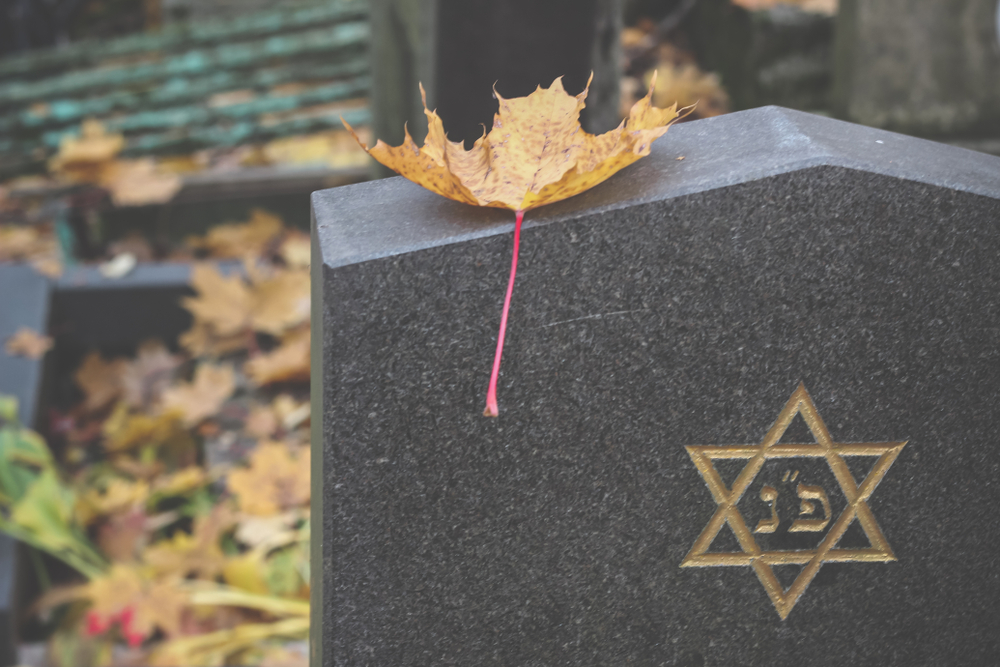
At Fox Monuments, we have years of experience as a leading provider of Jewish monuments for Long Island. Providing guidance and support for the Jewish community in times of hardship has always been our highest priority. As Long Island’s most trusted provider of Jewish monuments, we hold Jewish tradition in high esteem.
The Jewish faith has rich historical significance. There are thousands of customs, practices and rituals that govern Jewish culture. Their practices regarding death and mourning are no different. The Meal of Consolation , Chevra Kadisha, and Shiva are just a few of the notable Jewish traditions passed down through generations of Jewish families.
Most of the customs we’ve discussed in previous posts concern how the bereaved family proceeds during and after the burial. However, according to the Talmud and Kabbalah, the time directly after death is a crucial transition period. The belief is that directly after a death, the deceased experiences as much hardship as their family.
In this post, we’ll discuss the Jewish customs practiced in the period directly after a death. Read on for more information.
The Transition
Jewish texts describe the period right after death as a challenging transition. Naturally, the family is devastated and doing their best to cope with their loss. However, the Talmud and Kabbalah states that the soul of the deceased is experiencing its own challenges.
The Jewish belief system states that the souls of their dead do not leave the world until after the burial. Disconnected from its former life and body, the soul is in a vulnerable state. This is why burials occur as quickly as possible. It is also believed that the presence and prayers of loved ones at the funeral is an enormous comfort to the soul.
Many of the grieving family members find comfort in their belief that the soul remains conscious and aware. It provides a consolation for them to view their loved one as going through a period of transition.
Decisions
Immediately following a passing, decisions must be made. This is not necessarily unique, as in all religions, the family must make arrangements.
Many common burial traditions violate Jewish custom, however. Jewish law forbids practices by modern morticians, as they are considered a violation of the body. They are viewed as disrespectful to the deceased.
The grieving families must take these restrictions into consideration when making decisions. In some cases, there are no official documents left by the departed with specific guidelines.
Rituals
Within the immediate moments after a death, holy rituals are conducted. A few primary factors are taken into consideration. Maintaining the dignity of the deceased is first and foremost. The body must return to the earth from which it came. The soul must receive guidance and strength throughout its spiritual journey.
Directly following the moment of death, those present recite the “True Judge” blessing, “Baruch Dayan Ha’emet.” This translates to “blessed be the true judge.” The complete version of this prayer is said during the funeral service, along with the Kaddish.
The eyes and mouth are then closed by whoever is present. A sheet is draped over the body to cover it. Many elect a child or close relative to perform this task. The body of the deceased is then placed on the floor. If death occurs in a hospital, this is most likely not possible. However, all of the other customs should be observed.
Candles are then lit and placed around the head of the body. If the body is lowered to the floor, those lowering the body should ask forgiveness of the departed. Once the candles are lit, Psalms 23, 90 and 91 are recited.
Once these Psalms have been recited, the funeral home and rabbi should be contacted. It’s important to inform the funeral home that a Taharah will be needed. Plan your memorial service accordingly.
The Vigil
According to the Jewish faith, the human body is a sacred vessel. The privacy, dignity and virtue of the body is under holy protection in Jewish tradition. After the passing, this body remains equally as deserving of reverence. Those near the deceased are expected to conduct themselves with grace and dignity in order to demonstrate the proper respect for the dead.
A shemira (honor guard) remains with the body as often as possible, if not constantly. Anyone keeping vigil over the body recites prayers or psalms to comfort to the soul of the departed.
Restrictions & Ritual
Autopsies, embalming, displays and cremation are considered a violation of the body.
The burial happens as soon as possible. Since Jewish custom forbids posthumous medical practices to preserve the body’s sanctity, the funeral must take place immediately.
Conclusion
Judaism is a faith rich with stories and tradition. The specific rituals following death have deep significance to the faithful. Like many of the other Jewish death traditions, it helps to bring closure and consolation to the family in mourning.
Fox Monuments works with Long Island’s Jewish community, providing them with memorials that are a tribute to their faith. We understand the importance of religion in healing from loss.